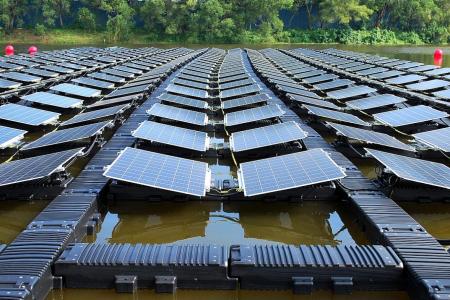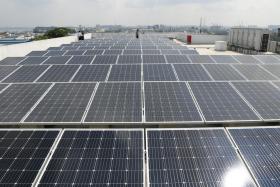HDB to study use of off-shore solar panels
In land-scarce Singapore, the quest to harvest more energy from the sun will soon go one step further: to the sea.
Yesterday, the Housing Board announced it will be signing a research collaboration with a landscaping firm.
The tie-up aims to study the development of a floating solar system for coastal marine conditions. It will look at how HDB's floating system can withstand harsher environmental conditions in the sea, such as stronger winds and wave action.
HDB chief executive Cheong Koon Hean said that over the past decade, the agency has been spearheading solar initiatives and accelerating solar adoption in Singapore.
For example, solar panels have been installed or are being fitted in more than 2,400 HDB blocks across Singapore.
By 2020, about 5,500 HDB blocks will be fitted with or identified for solar installation.
Currently, more than 95 per cent of Singapore's grid energy comes from the burning of natural gas.
Given Singapore's small land area, there is a limit to how much solar energy can be harvested from solar panels on land.
HDB's floating modular system was first tested in 2011 in a man-made waterway in Punggol to hold wetland plants. It was subsequently deployed to hold solar panels at a test bed in Tengeh Reservoir in Tuas in May this year.
The latest research agreement - which HDB will sign with ISO Landscape this week at the World Cities Summit, a sustainability conference - will look at how the HDB-designed floating modular system can hold solar panels in open-sea conditions.
In theory, Singapore has a few areas where offshore floating solar systems would be possible, said Dr Thomas Reindl, deputy chief executive of the Solar Energy Research Institute of Singapore.
But the locations should balance the need to be close enough to the mainland - to avoid use of lengthy submarine cable connections - with the need for marine space for other activities, he told The Straits Times.
Get The New Paper on your phone with the free TNP app. Download from the Apple App Store or Google Play Store now


